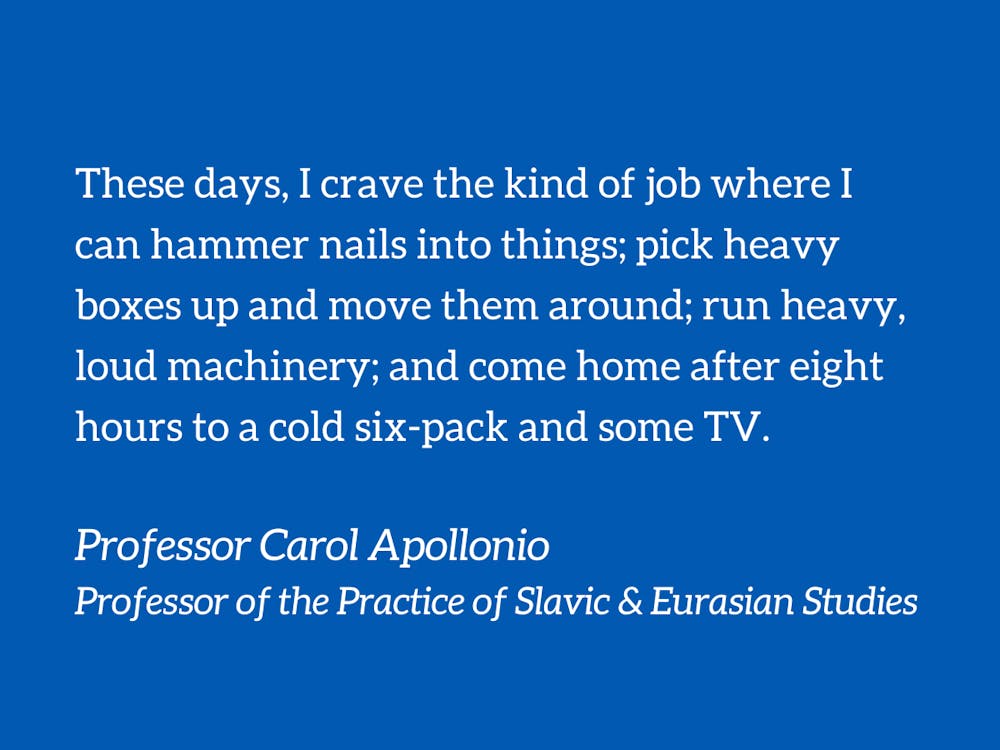Some people I love have spent their lives doing heavy labor: carpentry, warehouse work, truck driving. In my younger years, I spent a lot of time doing what they used to call “waitressing” — a profession that entails its share of heavy lifting and running back and forth, unpredictable hours, no benefits, and a miserable, insulting salary. A lot of what I do these days can be done lying on the sofa, but it is demanding in its own right. The insides of my brain ache at the end of a long day spent following complicated plot lines; remembering scores of names; deciphering impenetrable literary theories; explaining to students why perfect work can only earn them a 95; breaking into maddening, heavily barricaded websites; and grappling with — but never answering — the great accursed questions.
Recently my job has gotten way more difficult. When Russia invaded Ukraine, everything flipped. The authors I have admired and studied my whole life for their exploration of the conscience, of right and wrong, of the mysteries of human life on the planet, are now being quoted to support the brutalities going on in the war. I find myself facing questions like, "How can you study Russia when the Russians are committing such atrocities?" Yes: bombing hospitals and orphanages, blowing up apartment buildings, torturing and abusing innocent civilians. There is no doubt about these horrors — thanks to the miracles of the internet, we witness them in real-time.
These days, I crave the kind of job where I can hammer nails into things; pick heavy boxes up and move them around; run heavy, loud machinery; and come home after eight hours to a cold six-pack and some TV. Anything to drown out the awareness of my helplessness to ease the sufferings of the war’s innocent victims. But as they say, взался за гуж, не говори, что не дюж — “You picked up the damn thing, so don’t say that you can’t carry it.” (Don’t ask me to explain the original Russian, which has to do with the esoterica of horse harnesses.)
In short, I decided to teach Russian literature, and so I’m stuck.
Two years have elapsed since Russia’s invasion of Ukraine on Feb. 24, 2022. I find myself back where I started my study of the country, culture, literature and language — the Cold War — a time where the best thinkers were “repressed,” imprisoned, censored and murdered for speaking their minds. It’s almost as though these 35 years were an anomaly and now we’re back to business as usual. But some things over here in the “free world” of academic inquiry have disturbed me. There have been calls to stop studying Russia and even Russian literature altogether: Why give a minute’s time to thugs and executioners? (Dostoevsky is the enemy.)
In selecting my life’s path, I committed myself to studying a particular culture and literature. I did not commit myself to supporting whatever the political leaders over there were doing. And neither did the courageous writers whose works I teach. Regular people may not know better (ruining Russian businesses too), but it is a fact that Russia’s elite thinkers, artists, writers and journalists have had to leave the country — precisely for their opposition to the atrocities going on there now.
Now here’s the hard part. The mission of a university, especially an elite one, would seem to be to pursue objective truth — not to advocate for any political agenda, no matter how admirable. In short, the fact that I study Russian literature does not automatically mean that I support Vladimir Putin and his thugs.
If only I had decided to study ethics or environmental protection or human rights! Then I’d be off the hook. In my regular life, after all, I support good behavior, saving the planet and justice for all. But down here in my foxhole, I wonder: Is it possible that people might be studying ethics so as to learn how not to get caught when they cheat (maybe they won't catch me)? Or environmental regulation so they can get a job advising corporations how to get away with trashing the planet?
All that aside, I’m putting myself in the place of a minimum-wage worker hammering stuff onto an icy roof in a construction site in Maine; or a Durham city employee in a fluorescent vest pouring hot tar on a street on a 100-degree summer day. What does it look like from there to see someone whose job entails standing in a climate-controlled classroom lecturing smugly about a righteous cause; or sitting at a desk writing stuff about that cause; who can afford to buy local and never set foot in the Walmart; who has state-of-the-art health insurance, an outrageously high salary, a plump retirement fund, “summers off,” and — here’s the clincher — who can never be fired, e-v-e-r?
Out of sheer jealousy, spite, and frustration, I might very well come down from that icy roof and cast my vote for someone who shares my fury.
Professor Carol Apollonio has been teaching Russian literature at Duke for 40 years, and this is her final semester. Her column, "Final Rants from the Podium," typically runs on alternate Wednesdays.
Get The Chronicle straight to your inbox
Signup for our weekly newsletter. Cancel at any time.

